
Bewley's is an Irish hot beverage company, located in Dublin and founded in 1840, which operates internationally. Its primary business operations are the production of tea and coffee, and the operations of cafés. Bewley's has operations in Ireland, the UK and the United States; in the Boston area under the Rebecca's Cafe name and in California as Java City.
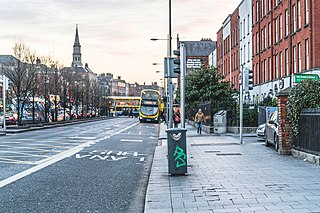
Dorset Street is an important thoroughfare on the northside of Dublin, Ireland, and was originally part of the Slighe Midh-Luchra, Dublin's ancient road to the north that begins where the original bridging point at Church Street is today. Subsequently, yet prior to the street being given its current name in the 18th century, the road was known as Drumcondra Lane and was shown on maps as such. It is divided into Dorset Street Lower and Dorset Street Upper.

Euronext Dublin is Ireland's main stock exchange, and has been in existence since 1793.
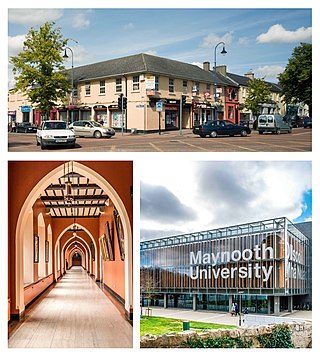
Maynooth is a university town in north County Kildare, Ireland. It is home to Maynooth University and St Patrick's College, a Pontifical University and Ireland's sole Roman Catholic seminary. Maynooth is also the seat of the Irish Catholic Bishops' Conference and holds the headquarters of Ireland's largest development charity, Trócaire. Maynooth is located 24 kilometres west of central Dublin.
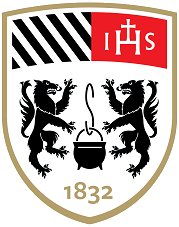
Belvedere College S.J. is a voluntary secondary school for boys in Dublin, Ireland. The school has numerous notable alumni in the arts, politics, sports, science, and business.
Daniel Cassidy is a former Irish Fianna Fáil politician who served as Leader of the Seanad from 2007 to 2011. He served as a Senator for the Labour Panel from 1982 to 2002 and 2007 to 2011 and a Teachta Dála (TD) for the Westmeath constituency from 2002 to 2007.

The National Wax Museum Plus is a waxworks in Dublin, Ireland. First opened in 1983 as the National Wax Museum, it was later relocated and renamed.

Dublin 1, also rendered as D1 and D01, is a historic postal district on the northside of Dublin, Ireland.

Dublin Docklands is an area of the city of Dublin, Ireland, on both sides of the River Liffey, roughly from Talbot Memorial Bridge eastwards to the 3Arena. It mainly falls within the city's D01 and D02 postal districts but includes some of the urban fringes of the D04 district on its southernmost side.
Michael Stapleton is regarded as having been the most skilled stuccodore working in the neoclassical or "Adam" style that dominated Dublin interior decoration in the final decades of the 18th century.
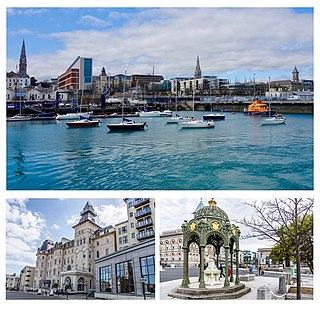
Dún Laoghaire is a suburban coastal town in Dublin in Ireland. It is the administrative centre of Dún Laoghaire–Rathdown.
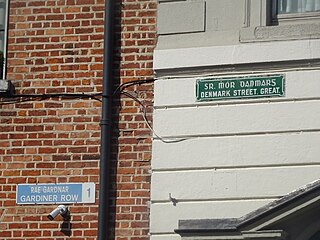
Great Denmark Street is a street in Dublin, Ireland. It leads to Mountjoy Square, is crossed by Temple Street/Hill Street, and is part of Gardiner Row.
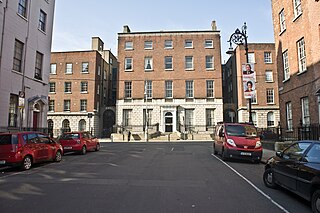
Belvedere House is a historic townhouse located on Great Denmark Street bookending North Great George's Street in Dublin, Ireland. It was built by George Rochfort, 2nd Earl of Belvedere between 1775 and 1786 at a cost of £24,000. The design and stucco of the interior ceilings was carried out by Michael Stapleton, a leading stuccodor and craftsman of his time. In 1841 it became a Jesuit college which houses the school Belvedere College.

The Clayton Hotel Burlington Road is a hotel in Dublin, Ireland. It is the largest hotel in central Dublin, and the second largest in County Dublin after the Citywest Hotel.
Dalata Hotel Group PLC is a hotel company which owns and operates hotels across Ireland and the UK. It is the largest hotel operator in Ireland with 7,101 rooms available across owned, leased and managed hotels. As of February 2020, the company operates 32 hotels across Ireland as well as managing 3 on behalf of external parties. Additionally, it operates 9 hotels across the UK.

Squatting in the Republic of Ireland is the occupation of unused land or derelict buildings without the permission of the owner. In the 1960s, the Dublin Housing Action Committee highlighted the housing crisis by squatting buildings. From the 1990s onwards there have been occasional political squats in Cork and Dublin such as Grangegorman, the Barricade Inn, the Bolt Hostel, Connolly Barracks, That Social Centre and James Connolly House.

The Bethesda Chapel, Dublin, was an Episcopal Church of Ireland, church on Granby Row and Dorset Street, Dublin.

North Great George's Street is a street on the Northside of Dublin city first laid out in 1766 which connects Parnell Street with Great Denmark Street. It consists of opposing terraces of 4-storey over basement red-brick Georgian townhouses descending on an increasingly steep gradient from Belvedere House which bookends the street from a perpendicular aspect to the North.

The Royal Hibernian Hotel was a hotel on Dawson Street, Dublin, Ireland. Its history dates back to 1751, making it one of the country's first hotels, and it was popular with the wealthy in the 19th century. Its restaurants specialised in haute cuisine, which gradually declined in popularity in the 20th century, leading to the hotel's closure in 1982 and subsequent demolition and replacement with the Royal Hibernian Way and the offices of Davy Stockbrokers.
















